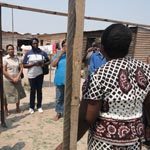
THE sight of toddlers sifting through heaps of rubbish for toys and occasional left-over food greets visitors to Hopley farm resettlement.
Report by Our Staff But one would also not miss cardboard box-roofed and rickety wooden cabins where children from the community conduct their school lessons.
The camp, a creation of government’s violent Operation Murambatsvina (Clean-up) in 2005, is home to over 22 000 people uprooted from in and around Harare.
People at Hopley, some 15km south of Harare, still live in very squalid conditions -— without running water, proper shelter or electricity — nearly a decade after they were displaced from their homes.
But it was the children in dire need of education that caught the attention of Rotary Club Hunyani, a local charitable organisation.
Last week, it came to the rescue of Tariro Hopley School, which has an enrolment of 1 200 children, where it donated some textbooks. The children had no textbooks and relied on newspapers to improve their literacy skills.
Speaking at a handover of the books to the School Development Committee (SDC), Rotary Club of Hunyani president, Ray Mawerera emphasised the importance of education to children as they are the future leaders.
“We hope that this batch of books will assist with the development of children’s literacy,” said Mawerera.
- Brother-to-Brother rescues Hopely youth from drug abuse
- Bringing critical care directly to communities impacted by cholera
Keep Reading
Rotary Club Hunyani works in co-ordination with Rotary International in its efforts to improve the provision of clean water, combating hunger, supporting education as well as improving health and sanitation.
SDC vice-chairperson Mavis Bosha said the community had resorted to pooling their meager resources to educate their children.
“Children in this community have no access to proper education,” said Bosha.
“Over the years we have witnessed a lot of fatalities as children had to cross traffic laden roads to gain access to schooling in nearby suburbs of Waterfalls and Glen Norah.”
“Children have to sit on the ground as we have neither furniture nor learning material,” she said, pointing at a big blackboard affixed to a garage door. The children also do not have access to sanitation facilities.
Bosha said of all the parents that sent their children to the school, less than a quarter could afford the US$10 monthly fees used to pay the teachers. Out of the 24 teachers at the school, only four are qualified.











